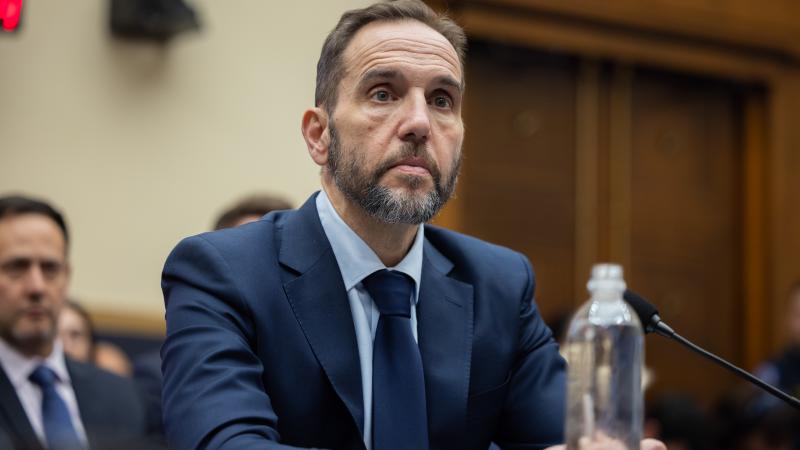Energy Secretary tells House committee that LNG export permit pause will be over by early 2025
During the hearing, Republicans on the House Oversight Committee grilled Energy Secretary Jennifer Granholm about the administration’s “war on energy.”
Energy Secretary Jennifer Granholm told a House Oversight Committee Thursday that the pause on liquified natural gas (LNG) export permits would be rescinded by the first quarter of 2025. The statement was made in response to questions from Rep. Clay Higgins, R-La., during a hearing.
In January, the Biden administration had announced a pause on export permits of LNG to countries without a free trade agreement with the U.S., which includes European nations. The pause was to do a review of the permits to determine if they are in the public interest. The permit applications are reviewed by the Department of Energy, and the pause impacted only new applications.
Higgins wanted to know if the Department of Energy had yet determined if new export permits were in the public interest.
“We’re in the middle of a study and updating our assessment of what is in the public interest,” Granholm answered, which would be complete in the first quarter of 2025.
“Would that be a no?” Higgins replied.
Granholm disputed the characterization of the pause as a ban, as Higgins and other committee members called it. The pause, she said, has no impact on exports that are happening now, she said. “There is no cut off. We have to do an assessment of what's in the public interest given the huge amounts that we have authorized so far,” Granholm explained.
Critics, however, have argued that the policy decision, even if it lasts only a year, still has environmental and economic impacts, including scaring off investors with regulatory uncertainty.
War on Energy
During the hearing, Republicans on the committee grilled Energy Secretary Jennifer Granholm about the administration’s “war on energy.”
“We will not stand by solidly as the Biden administration subverts America's energy independence and demonizes this critical industry,” Committee Chair Rep. James Comer, R-Ky., said.
Democrats on the committee, as well as Granholm, denied that the Biden administration was doing anything to impede American energy production, citing the administration’s clean energy policies.
“Unlike my colleagues across the aisle, who want to promote falsehoods about this imaginary war on energy, Democrats recognize that the transition to clean energy is not just good for our climate and good for our planet, but also good for our economy and good for our communities,” Rep. Jamie Raskin, D-Md., said.
Granholm said that the U.S. is the number one oil and gas exporter in the world, in addition to “aggressively seeking to be larger in our deployment of renewable energy.”
“We are an energy country, and we will remain an energy exporting country,” Granholm added.
While pointing to record-high oil production to dispute accusations that the Biden administration is impeding oil and gas production, Democrats on the committee asked a number of questions concerning climate change.
“Climate change is the defining crisis of our time. And we know that burning fossil fuels is by far the leading factor in contributing to climate change, a fact that fossil fuel companies knew about decades ago, but suppressed,” Raskin said.
Raskin referred to a joint staff report from the Senate Budget Committee that claims to have found evidence that oil companies knew that carbon dioxide emissions could increase global temperatures, but because they went on producing oil, the report argues, they were deceiving the public about the risk.
Critics of the campaign, which has been going on for years, have said that oil companies’ research showed what all publicly available research was showing — there is a risk of global warming from carbon dioxide emissions. As there was uncertainty in the public sphere concerning the degree of that risk, there were internal debates among the employees of the oil companies. The campaign argues that this debate, which continues today, was an act of deception.
Committee report
The House Oversight Committee released a report Thursday that ties the Biden administration’s energy policies to the high cost of energy, erosion of consumer choice through appliance efficiency standards, and a burdensome regulatory environment for businesses.
The committee report, however, argues that America’s energy dominance began under policies of the Trump administration, as well as innovations in the oil and gas industry, which the report says is a net good for the country.
“The resulting energy independence had profound positive impacts on consumer prices, both in the U.S. and abroad, allowing for more access to supplies that would help drive economic prosperity for American consumers and businesses,” the report states.
The Biden administration’s policies, the report claims, have raised the cost of production and the cost to consumers. The national average gas price was $2.39 per gallon when Biden took office, and by the time Russia invaded Ukraine, according to AAA data, the price had already risen to $3.57 per gallon. The report then outlines how President Joe Biden used the Strategic Petroleum Reserve to manage gas prices in order to avoid a political backlash.
The report provides a list of what it calls “misguided actions” that Biden took. These include moratoriums and obstructions of oil and gas leases, electric vehicle mandates, methane emissions standards, attempts to eliminate tax credits for fossil fuel production, forcing the Federal Trade Commission to investigate oil and gas companies for price collusion, global agreements to end fossil fuel financing, and pushing OPEC to increase production while hampering production domestically.
The report concludes by saying that the Biden administration has sent America down a “dangerous path,” the consequences of which will be “felt for decades to come.”
















